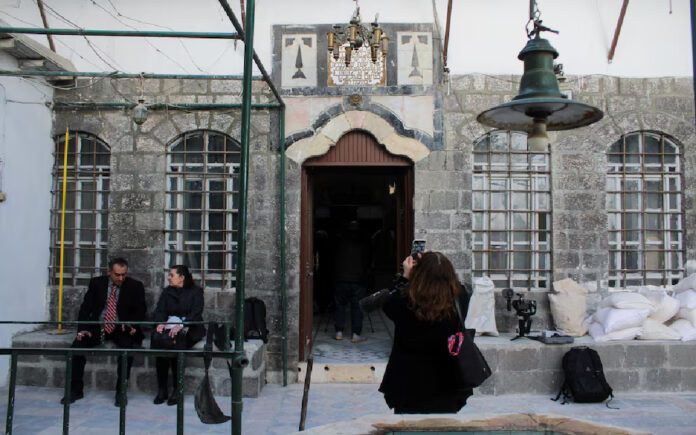Damascus: For the first time in 30 years, Rabbi Joseph Hamra and his son Henry stood inside a synagogue in the heart of Damascus, reading from a Torah scroll. As they traced their thumbs over the delicate handwritten text, the moment felt surreal—like stepping back into a long-lost home.
The father and son had fled Syria in the 1990s when then-President Hafez al-Assad lifted restrictions on the country’s Jewish community, allowing them to leave after decades of imposed limitations on property ownership and employment. The vast majority of Syria’s few thousand remaining Jews departed almost immediately, leaving behind only a handful in the capital. Joseph and Henry, who was just a child at the time, resettled in New York.
For the first time in three decades, Rabbi Joseph Hamra and his son Henry read from a Torah scroll in a synagogue in the heart of Syria's capital, Damascus https://t.co/V3ZfsbU8YV pic.twitter.com/54rqpeeYp5
— Reuters (@Reuters) February 19, 2025
“Weren’t we in a prison? So we wanted to see what was on the outside,” said Joseph, now 77, reflecting on their departure. “Everyone else who left with us is dead.”
However, following the fall of President Bashar al-Assad in December, the Hamra family seized the opportunity to visit Damascus—a journey once unimaginable. Their return was facilitated by the Syrian Emergency Task Force, a U.S.-based advocacy group.
During their visit, they met with Syria’s deputy foreign minister at the ministry, now controlled by caretaker authorities installed by the Islamist rebels who ended more than 50 years of Assad family rule. The new leadership has pledged to ensure that all of Syria’s communities, including religious minorities, will have a role in shaping the country’s future. Yet, lingering concerns about religious intolerance and reports of conservative Islamic influence have left many secular Syrians and minority groups uneasy.
Henry Hamra, now 48, revealed that Syria’s foreign ministry had assured them of efforts to protect Jewish heritage in the country.
“We need the government’s help, we need the government’s security, and it’s going to happen,” he said.
As they wandered through the narrow alleys of Damascus’ Old City—a UNESCO World Heritage Site—they encountered old neighbors, including Palestinian Syrians. Later, they marveled at the Hebrew inscriptions that adorned the walls of several synagogues.
“I want to see my kids come back and see this beautiful synagogue. It’s a work of art,” Henry said.
However, signs of loss were evident. One of the synagogues was missing a golden-lettered Torah, now stored in a library in Israel. Thousands of Syrian Jews had fled to Israel over the course of the 20th century, taking with them pieces of their heritage.
Also Read | Trump Calls Zelenskiy a ‘Dictator Without Elections,’ Urges Quick Action
While the Jewish school and synagogues in the Old City remained relatively well-preserved, Syria’s largest synagogue—located in Jobar, a historic suburb of Damascus—was not as fortunate. Once a thriving Jewish hub for centuries, Jobar was devastated during Syria’s nearly 14-year civil war.
Built in honor of the biblical prophet Elijah, the Jobar Synagogue stood as a testament to Syria’s Jewish history. However, it was looted before being reduced to rubble amid the conflict, marking the erasure of yet another fragment of Syria’s diverse past.



